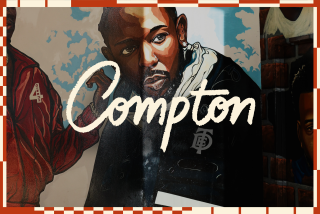She Has Franchise on Big Macs, Own Recipe for Success
- Share via
Lonear Heard began her day in a tough part of town. A little before 10 a.m., her champagne gold Mercedes Benz swung into the McDonald’s lot at Avalon and Central, a block north of where the Los Angeles Police Department bases its busiest gang detail.
She parked and stepped out, wearing an executive blue suit, and walked toward one of the six fast-food businesses that have placed her among the nation’s most successful black franchisees.
A few feet from the door, she couldn’t resist. She stooped to the asphalt and snatched up a flattened straw wrapper. “There’s no need for us to pass by a piece of paper when we can pick it up,” she said. “It only takes a second.”
With that do-it-yourself attitude and attention to detail, the 45-year-old Heard has developed a surprisingly successful chain of McDonald’s restaurants stretching from inner city South-Central to Compton and suburban Long Beach. For example, the Avalon outlet, which Heard described as a fading franchise before she acquired it in 1983, now stands as a thriving street-corner oasis in a neighborhood often parched by despair.
Last year, her restaurants had $11.9 million in sales--nearly $2 million each, well above the $1.3-million national average recorded by McDonald’s roughly 7,500 stores. The clean tables, smiling employees and quality operations common there also helped earn her the corporation’s prestigious Golden Arch Award the year before.
“She has been exemplary in all that she’s done,” said Bill Brownstein, president of the 300-member Southern California association of McDonald’s operators. “She’s worked, she’s gotten her hands dirty.”
Heard also keeps active in the communities she serves. She sponsors annual talent shows to raise money for sickle cell anemia research, the Salvation Army and other charities. And she hosts weekly bingo games for senior citizens, serving them free coffee and McDonald’s hot apple pies. The City of Compton named her Businesswoman of the Year in 1986, and the Chamber of Commerce followed with its Humanitarian Award. She is annually listed in Who’s Who in Finance and Industry. Last month, she made the cover of Black Enterprise magazine.
Moreover, Heard is a major employer of teen-age blacks, who make up 90% of her 500-member work force. And she lets her workers know that opportunities for advancement are real. John Tisby went to work for Heard at age 15 and now, a dozen years later, manages one of her two Los Angeles stores. Lindsay Hughes, 36, began as supervisor in 1973 and now has a small ownership interest in the parent Heard Management Corp. Hughes drives a flashy Jaguar boasting a cellular telephone and the license plate, “MAC JAG.”
Heard drives her somewhat more modest Mercedes--a five-year-old, slightly nicked model with 106,000 miles--as she travels each workday from her home in Buena Park. On her daily rounds between her suburban and inner city stores, she passes through some pretty down and out neighborhoods and frowns with frustration. “I wish that they were better and wonder if I can help to make them better,” she said in a recent interview.
Honors in College
“Then I try to remind myself that I hire from the same locality, that I promote from within and that I do help the communities in that way. Maybe it’s not in the form of a building or something you can see, something that’s tangible. But on an intangible basis, I am helping.”
Heard’s own climb to the top was a struggle from the start. She grew up in Heidelberg, Miss., with parents who were sharecroppers. She remembers working in the fields alongside them, a brother and three sisters. “It was very hot, very strenuous.” But her desire to be a teacher pushed her in school.
“I wanted to get all As,” she recalled, “and I pretty much did.”
In 1960, she graduated second in her high school class. And four years later, she obtained a honors degree in business administration from tiny Rust College, a Methodist school in Holly Springs, Miss. (She now serves on the board of trustees and, in 1982, gave the college $50,000 toward an endowment.)
There, she met and married her first husband, James T. Heard, a center on the football team. And when he completed school two years later, they moved to Chicago, where he worked as a salesman and she as a secretary.
After saving money for two years, they returned to school in Atlanta; Heard received a masters in business administration from Atlanta University. Then, a Chicago colleague of her husband’s offered them the chance to manage a McDonald’s in Compton.
Confident in themselves, they moved to California in 1970 as franchise employees. The next year they bought out the owner using $20,000 in personal savings and a $350,000 loan from Chicago’s Urban Fund Inc. James focused on the management details, while Lonear kept the books. And, as with any new business, money was initially tight. To stay ahead, Lonear worked some days as a substitute teacher in the Compton school district, and some evenings as a business instructor at Compton Community College.
But after two tough years, business began to improve, and the couple acquired a second Compton franchise with help from the Small Business Administration. In 1974, they added a third, in Long Beach, using previous profits and, this time, a Bank of America loan.
Then came a family tragedy. In 1981, a month after building a fourth outlet, in Los Angeles, James died of cancer at 38. Lonear, then 39, was left to manage what had grown into a substantial business while also caring for the couple’s four children.
“My greatest challenge at the time was our oldest daughter,” Heard recalled. The teen-ager’s high school grade average tumbled and took a while to recover. “She really felt the loss.”
But Heard, a shy, private woman protective of family and friends, found strength in her lifelong Christian beliefs, which she now considers a vital element in her business success.
Determined to keep the franchises thriving, she bought the Avalon restaurant--her fifth--in 1983 and built another in Long Beach in 1984. And she slowly made the restaurants reflect her own personality. The insides are clean and decorated with colorful artwork. And the flower beds outside are freshly tilled.
“I want to have a beautiful landscape, like the one I have at home,” Heard said. “I tell my people that when spring comes I want instant color.” So she spends a little extra to buy plantings already in bloom.
She also stations a security guard at inner city locations where the crime rate is high. “I think that is probably the greatest additional expense that I incur at an inner city location,” said Heard. However, it pays for itself by providing “some psychic protection in the minds of your customers and your employees.”
Concerns about fast food and nutrition haven’t gone unnoticed by Heard. In fact, she takes some pleasure in her growing salad business. “Our people tend to like Big Macs or sandwiches with a lot of meat, whereas some people will tend to like salads more. But with the emphasis on nutrition, these days I think the differences are coming together.
“What happens is people buy a salad and a sandwich,” she says with a smile, “which drives my average check up.”
Slight and slender at 5 foot 2 and 120 pounds, she has forced herself to be more outgoing and demonstrative in her public dealings. She accepts every speaking occasion or school career day she can schedule, admitting that she occasionally feels pressure because she is black and a woman. “I feel obligated that I should be an example to others.”
Her employees know that, on the job, Heard’s temper is slow to boil but quick to boil over “once my tolerance level has been reached.” Yet, the toughness is only on the outside.
16-Hour Days
“I never like to fire a person,” Heard said. “That really bothers me. I have fired people, then closed the door and cried.”
She rewards the good work of her 45 managers with little perks, such as a few days’ use of the company cabin at Big Bear Lake. And she makes sure that each gets at least one Sunday a month off, so that “if they want to” they can go to church.
She enjoys reading and sewing, but gives most of her time to work. She starts at 6 in the morning and sometimes goes until 10 at night. When she married Compton City Clerk Charles Davis in August--they met one night when Heard dropped in on a city council meeting--she could only find time for a week’s honeymoon at a resort in Manzanillo, Mex.
Despite all her accomplishments, Heard doesn’t consider herself anything close to a remarkable woman. “And maybe that’s what keeps me going.”
Black Total Company Location Type Units Units 1. McDonald’s Corp. Oak Brook, Ill. Fast food 365 5,550 2. Popeye’s Famous Jefferson, La. Fast food 195 650 Fried Chicken & Biscuits Inc. 3. Burger King Corp. Miami, Fla. Fast food 161 3,982 4. Kentucky Fried Louisville, Ky. Fast food 98 4,700 Chicken Corp. 5. Wendy’s Int’l Dublin, Ohio Fast food 59 2,434 Inc. 6. Church’s Fried San Antonio, Fast food 57 450 Chicken Inc. Tex. 7. Century 21 Real Irvine, Calif. Real estate 50 6,600 Estate Corp. 8. International Dairy Bloomington, Ice cream 50 4,900 Queen Inc. Minn. 9. Subway Sandwiches Milford, Conn. Fast food 50 1,285 & Salads 10. Abraham & Chatsworth, Personnel 40 400 London Ltd. Calif. agency
Start-Up Costs 1. $350,000 2. $225,000 3. $290,000-375,000 4. $620,000-820,000 5. $750,000-1,300,000 6. $300,000-350,000 7. $9,000-15,000 8. $30,000 9. $29,900-60,000 10. $8,000
Source: Black Enterprise
More to Read
Inside the business of entertainment
The Wide Shot brings you news, analysis and insights on everything from streaming wars to production — and what it all means for the future.
You may occasionally receive promotional content from the Los Angeles Times.









